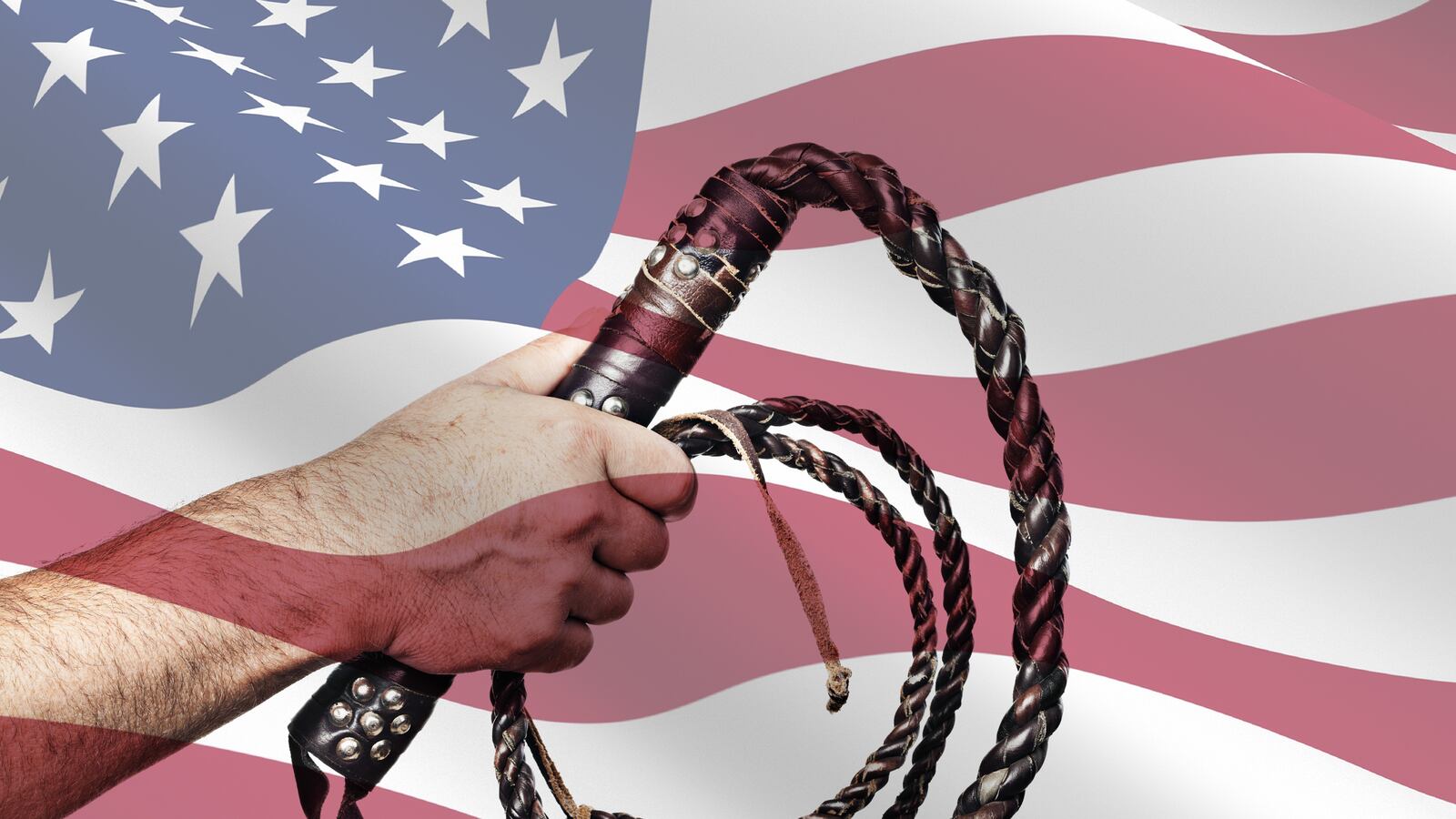’Twas a beautiful fourth of July’s morning that the golden rays of the sun came a shooting through our iron grated windows, that I sat at the table in deep and melancholy thoughts and reflections, that the weight of a big heavy hickory cane came plump across my knuckles, for handing the man next to me a piece of meat which I did not want. After I got back to the shop, the Keeper called me up before him (which I did no more care about than if I had never stood before him before, for I began to get use to his calls) and ask me if I certainly meant to break over and run through those bright and golden rules of his. I tried to make some excuse for breaking over that rule. I tried to find a mantle to cover the deed, but all in vain. I had broken the rule and forgotten the advice of Mr. Tylor, and now I was arraigned and stood convicted and must suffer the penalty of it, by suffering under the bending and biting galls of the old cat, and be lock up in the dungeon until the next morning.
Never will I forget that bright and palmy day of July as I was strolling to the hospital that I overtook Mills, who had been an inmate with me in the House of Refuge, and fell in a conversation with him until one of the relief officers stepped up to us and ask us our names and the name of the shops that we belong to. On my returning back to the shop from the hospital, I found that the Relief Keeper had caught us a talking and had reported us to our respected keepers for talking.
The Keeper called me up to his desk and ask me who that young chap was that I was talking to, and what we was talking about. “I see,” said the officer, “that you don’t try nor mean to get along here without suffering under the lash every day. What to do with you I know not, without it is to whip you to death right on the spot.”
While the Keeper was talking to me, Esq. Cook, the Warden of the prison, came through the shop, and the Keeper took him one side and whispered something into his ear about me. They held a long conversation about me for some minutes while I stood with my face towards the desk.
After they had got through with there their conversation, Esq. Cook took his seat behind the Keeper’s desk, and in a rash and an ugly tone, the Keeper called me in the presence of Esq. Cook and said, “This boy, Esq., is becoming a harden convict. He is listening to the silly tales and counsels of the older inmates, and following their devilish vices, and learning all the iniquities and miseries that is prevailing within the prison. He is letting these older inmates have their influence over him, and learning to play their mean and devilish tricks, and what to do with him I know not. I have whip him until the blood came streaming from his back, and it appears to have no effect upon the boy at all. What to do with him, sir, I cannot tell. I am tired of throwing the lash upon his back. He is a smart boy and seems to be endown with good reasons and factualities, and if I let him lead the course that he is now a leading, he will surely become an harden convict, and one day or another will be loaded down with heavy balls and chains and become the inmate of a dark and a gloomy dungeon. What shall I do with him, Esq.? I know no other way to do, only to put him over into your hands, and into your hands I now place the harden youth. Take him and act out your own pleasure with him.”
The reader must have some idea of the feelings of my mind during that conversation of the Warden’s and the Keeper. There I stood, a nothing but a mere boy, before two officers, a weeping and crying. Horrors, horrors, horrors, eternal horror of horrors came beating and pealting upon my mind.
“You say,” said Esq. Cook to the officer, who stood with the cats in his hand, “that you don’t know what to do with yon boy.”
“No, sir,” the officer replied. “It was only yesterday that I gave him a severe punishment, and now I give the youth over into your hands, that he may pass through hard and rough treatment.”
As the officer said these words, Esq. Cook ask him what kind of treatment I had been through besides the cats. “Have you consign him in solitary confinement yet?”
“Yes, sir,” said the officer. “I have consign him away to a dark and a gloomy dungeon and fed him on bread and water once a day, and it has had no effect upon the boy at all, and if he is allowed to go on in the path which he is now treading, he will be the ringleader of all the vices and crimes that are prevailing within the walls of a gloomy prison.”
“Into your hands,” said Esq. Cook, “will I commend yon boy. See that you go under a hard and rough treatment with him first with the cats. Then, after that, give him over into my hands, and I’ll see what virtue there is in the stocks. Then, if he keeps on leading the career that he now leads, the crack of the pistol shall prove his destiny.”
As Esq. Cook said these words, the officer ordered me to pull off my shirt. I obeyed his authority and took off my shirt, and he sunk forty and two blows into my back with the cats. After I had put on my shirt, Esq. Cook ordered me to follow him. Like a dog with his tail hanging down to the ground did I follow this venerable gentleman, whose gray hairs I honor and respect to this very day. Pressing his way onward, he led me to the south wing and enclosed me in a large box which they called the stocks, and made my hands feet and head fast so as I could not stir my body at all. These stocks when closed and made fast are as dark and black as midnight. It benumbs the hands and feet and stops the circulation of the blood for a long time. Not a spark or one single ray of light is there to be seen until the officer sees fit to open the door and let his captive free.
It was late in the afternoon when I heard the heavy tramp of two officers making their way to the box where I was consign. The heavy weights of their canes coming down upon the floor seemed to tell me that they was the very ones who had consign me to the stocks. As they approach this box of torture, they unlock the door, and made my hands and feet free from torture and pain, and ordered me back to the shop. Slowly and sadly did I pace my way back to the shop, in a pensive manner, while the Keeper kept close up at my heels, with a big hickory cane in his hand.
The reader must imagine to himself how I felt, and the pain I was under goin’ and bearing after goin’ through this treatment of punishment. You must remember that I felt weary and faint, and was glad enough to lay my head down upon the cold floor as soon as I entered my cell, and though it was strictly against the rule for the convict to swing his hammock before the bell rung at eight o’clock for him to turn in, yet so faint and exhausted was I that I swung my bed just as soon as I entered my cell.
The night guard came along and look into my cell and found me covered up in bed. “Haloo. Here,” said he, “come up here to the door, sir.”
I got up on my hands and knees and creep to the door as well as
I could, suffering with pain at every inch I moved.
“Who told you to go to bed, sir?” said the guard. “Who gave you permission, sir? Don’t you know that it is against the rules for you to swing your hammock?”
“Sir,” said I, “the pains and sufferings which I have endured this day has caused me to break over this rule.”
“Don’t care,” said he, “if a man is breathing his last breath of life, he is no business to break over the rules and go to bed without permission. Get up, sir, and put on your clothes.”
In vain did I try to reason and expostulate with the hard and cold hearted devil, but all of my tears and begging and reasoning and rough and cruel treatment couldn’t make any effect on this cold hearted devil’s heart, but went right off and got the key of my cell door and unlock it and ordered me to follow him down stairs.
Pensively and slowly did I follow the demon down stairs, while the cold clods of blood still clung to my back, groping my way down the stairs. He led me out into the kitchen and order me to pull off my shirt. I strip myself and turned my back around towards the cruel hearted guard, and all the marks and blood that came oozing from my back couldn’t soften the heart of that guard, and he laid four light lashes upon my back with the cats.
Excerpted from The Life and the Adventures of a Haunted Convict by Austin Reed. Copyright © 2016 by Caleb Smith. Excerpted by permission of Random House, A Penguin Random House Company. All rights reserved. No part of this excerpt may be reproduced or reprinted without permission in writing from the publisher.






